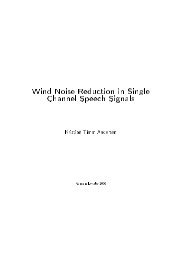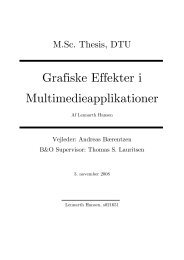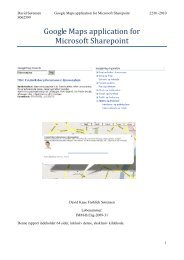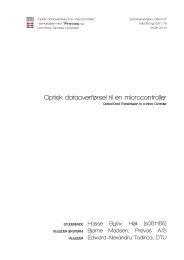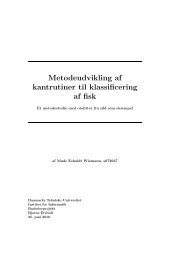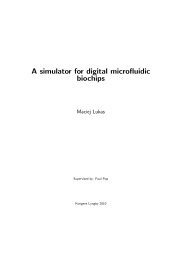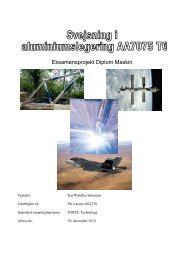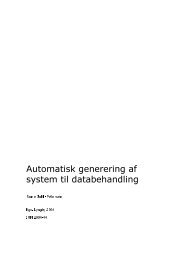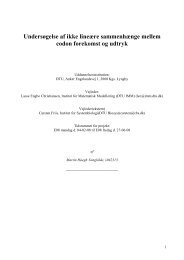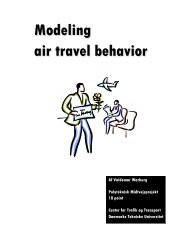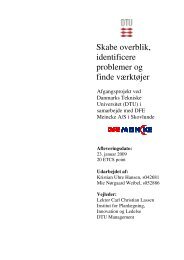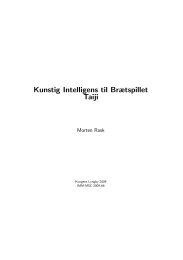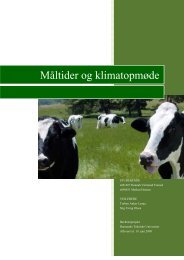- Page 1: Transformation of Applicative Speci
- Page 5: Resumé RAISE udviklingsmetoden er
- Page 8 and 9: viii
- Page 10 and 11: CONTENTS 6.4.3 Transforming Value E
- Page 12 and 13: CONTENTS 12.2.4 Interactive Transfo
- Page 14 and 15: xiv
- Page 16 and 17: LIST OF FIGURES xvi
- Page 18 and 19: CHAPTER 1. INTRODUCTION This stepwi
- Page 20 and 21: CHAPTER 1. INTRODUCTION 1. Formulat
- Page 22 and 23: CHAPTER 1. INTRODUCTION 1.7 Content
- Page 24 and 25: CHAPTER 2. GENERAL IDEA end value e
- Page 26 and 27: CHAPTER 2. GENERAL IDEA • In the
- Page 30 and 31: CHAPTER 3. TERMINOLOGY Expected Typ
- Page 32 and 33: CHAPTER 3. TERMINOLOGY Example 3.5
- Page 34 and 35: CHAPTER 3. TERMINOLOGY 18
- Page 36 and 37: CHAPTER 4. CONSTRAINTS further deve
- Page 38 and 39: CHAPTER 4. CONSTRAINTS of interest.
- Page 40 and 41: CHAPTER 4. CONSTRAINTS 24
- Page 42 and 43: CHAPTER 5. TRANSFORMABILITY scheme
- Page 44 and 45: CHAPTER 5. TRANSFORMABILITY 28
- Page 46 and 47: CHAPTER 6. TRANSFORMATIONS 6.2.1 Tr
- Page 48 and 49: CHAPTER 6. TRANSFORMATIONS Example
- Page 50 and 51: CHAPTER 6. TRANSFORMATIONS Applicat
- Page 52 and 53: CHAPTER 6. TRANSFORMATIONS object A
- Page 54 and 55: CHAPTER 6. TRANSFORMATIONS type T =
- Page 56 and 57: CHAPTER 6. TRANSFORMATIONS where ge
- Page 58 and 59: CHAPTER 6. TRANSFORMATIONS Ranged s
- Page 60 and 61: CHAPTER 6. TRANSFORMATIONS ✄ end
- Page 62 and 63: CHAPTER 6. TRANSFORMATIONS Value In
- Page 64 and 65: CHAPTER 6. TRANSFORMATIONS ✄ sche
- Page 66 and 67: CHAPTER 6. TRANSFORMATIONS A case e
- Page 68 and 69: CHAPTER 6. TRANSFORMATIONS is due t
- Page 70 and 71: CHAPTER 6. TRANSFORMATIONS 6.4.4 Tr
- Page 72 and 73: CHAPTER 6. TRANSFORMATIONS 56
- Page 74 and 75: CHAPTER 7. CORRECTNESS OF TRANSFORM
- Page 76 and 77: CHAPTER 7. CORRECTNESS OF TRANSFORM
- Page 78 and 79:
CHAPTER 7. CORRECTNESS OF TRANSFORM
- Page 80 and 81:
CHAPTER 7. CORRECTNESS OF TRANSFORM
- Page 82 and 83:
CHAPTER 7. CORRECTNESS OF TRANSFORM
- Page 84 and 85:
CHAPTER 7. CORRECTNESS OF TRANSFORM
- Page 86 and 87:
CHAPTER 7. CORRECTNESS OF TRANSFORM
- Page 88 and 89:
CHAPTER 8. SPECIFICATIONS The rewri
- Page 90 and 91:
CHAPTER 8. SPECIFICATIONS RSL speci
- Page 92 and 93:
CHAPTER 8. SPECIFICATIONS The FUNC
- Page 94 and 95:
CHAPTER 8. SPECIFICATIONS out, that
- Page 96 and 97:
CHAPTER 8. SPECIFICATIONS construct
- Page 98 and 99:
CHAPTER 8. SPECIFICATIONS 8.4.1 Mor
- Page 100 and 101:
CHAPTER 8. SPECIFICATIONS PRECOND_T
- Page 102 and 103:
CHAPTER 8. SPECIFICATIONS if length
- Page 104 and 105:
CHAPTER 8. SPECIFICATIONS subtypes.
- Page 106 and 107:
CHAPTER 8. SPECIFICATIONS 8.5.2 Cha
- Page 108 and 109:
CHAPTER 8. SPECIFICATIONS axiom [ m
- Page 110 and 111:
CHAPTER 8. SPECIFICATIONS Specifica
- Page 112 and 113:
CHAPTER 8. SPECIFICATIONS the lack
- Page 114 and 115:
CHAPTER 9. IMPLEMENTATION OF THE TR
- Page 116 and 117:
CHAPTER 9. IMPLEMENTATION OF THE TR
- Page 118 and 119:
CHAPTER 9. IMPLEMENTATION OF THE TR
- Page 120 and 121:
CHAPTER 9. IMPLEMENTATION OF THE TR
- Page 122 and 123:
CHAPTER 9. IMPLEMENTATION OF THE TR
- Page 124 and 125:
CHAPTER 9. IMPLEMENTATION OF THE TR
- Page 126 and 127:
CHAPTER 10. EXAMPLES OF TRANSFORMAT
- Page 128 and 129:
CHAPTER 10. EXAMPLES OF TRANSFORMAT
- Page 130 and 131:
CHAPTER 10. EXAMPLES OF TRANSFORMAT
- Page 132 and 133:
CHAPTER 10. EXAMPLES OF TRANSFORMAT
- Page 134 and 135:
CHAPTER 10. EXAMPLES OF TRANSFORMAT
- Page 136 and 137:
CHAPTER 11. TEST 11.1.1 Lexer and P
- Page 138 and 139:
CHAPTER 11. TEST An overview of the
- Page 140 and 141:
CHAPTER 12. POSSIBLE EXTENSIONS OF
- Page 142 and 143:
CHAPTER 12. POSSIBLE EXTENSIONS OF
- Page 144 and 145:
CHAPTER 12. POSSIBLE EXTENSIONS OF
- Page 146 and 147:
CHAPTER 13. CONCLUSION RSL AST and
- Page 148 and 149:
CHAPTER 13. CONCLUSION 132
- Page 150 and 151:
BIBLIOGRAPHY [ST02] Donald Sannello
- Page 152 and 153:
APPENDIX A. USING AND EXTENDING THE
- Page 154 and 155:
APPENDIX A. USING AND EXTENDING THE
- Page 156 and 157:
APPENDIX B. CONTENTS OF CD-ROM 140
- Page 158 and 159:
APPENDIX C. FORMAL SPECIFICATIONS O
- Page 160 and 161:
APPENDIX C. FORMAL SPECIFICATIONS O
- Page 162 and 163:
APPENDIX C. FORMAL SPECIFICATIONS O
- Page 164 and 165:
APPENDIX C. FORMAL SPECIFICATIONS O
- Page 166 and 167:
APPENDIX C. FORMAL SPECIFICATIONS O
- Page 168 and 169:
APPENDIX C. FORMAL SPECIFICATIONS O
- Page 170 and 171:
APPENDIX C. FORMAL SPECIFICATIONS O
- Page 172 and 173:
APPENDIX C. FORMAL SPECIFICATIONS O
- Page 174 and 175:
APPENDIX C. FORMAL SPECIFICATIONS O
- Page 176 and 177:
APPENDIX C. FORMAL SPECIFICATIONS O
- Page 178 and 179:
APPENDIX C. FORMAL SPECIFICATIONS O
- Page 180 and 181:
APPENDIX C. FORMAL SPECIFICATIONS O
- Page 182 and 183:
APPENDIX C. FORMAL SPECIFICATIONS O
- Page 184 and 185:
APPENDIX C. FORMAL SPECIFICATIONS O
- Page 186 and 187:
APPENDIX C. FORMAL SPECIFICATIONS O
- Page 188 and 189:
APPENDIX C. FORMAL SPECIFICATIONS O
- Page 190 and 191:
APPENDIX C. FORMAL SPECIFICATIONS O
- Page 192 and 193:
APPENDIX C. FORMAL SPECIFICATIONS O
- Page 194 and 195:
APPENDIX C. FORMAL SPECIFICATIONS O
- Page 196 and 197:
APPENDIX C. FORMAL SPECIFICATIONS O
- Page 198 and 199:
APPENDIX C. FORMAL SPECIFICATIONS O
- Page 200 and 201:
APPENDIX C. FORMAL SPECIFICATIONS O
- Page 202 and 203:
APPENDIX C. FORMAL SPECIFICATIONS O
- Page 204 and 205:
APPENDIX C. FORMAL SPECIFICATIONS O
- Page 206 and 207:
APPENDIX C. FORMAL SPECIFICATIONS O
- Page 208 and 209:
APPENDIX C. FORMAL SPECIFICATIONS O
- Page 210 and 211:
APPENDIX C. FORMAL SPECIFICATIONS O
- Page 212 and 213:
APPENDIX C. FORMAL SPECIFICATIONS O
- Page 214 and 215:
APPENDIX C. FORMAL SPECIFICATIONS O
- Page 216 and 217:
APPENDIX C. FORMAL SPECIFICATIONS O
- Page 218 and 219:
APPENDIX C. FORMAL SPECIFICATIONS O
- Page 220 and 221:
APPENDIX C. FORMAL SPECIFICATIONS O
- Page 222 and 223:
APPENDIX C. FORMAL SPECIFICATIONS O
- Page 224 and 225:
APPENDIX C. FORMAL SPECIFICATIONS O
- Page 226 and 227:
APPENDIX C. FORMAL SPECIFICATIONS O
- Page 228 and 229:
APPENDIX C. FORMAL SPECIFICATIONS O
- Page 230 and 231:
APPENDIX C. FORMAL SPECIFICATIONS O
- Page 232 and 233:
APPENDIX C. FORMAL SPECIFICATIONS O
- Page 234 and 235:
APPENDIX C. FORMAL SPECIFICATIONS O
- Page 236 and 237:
APPENDIX C. FORMAL SPECIFICATIONS O
- Page 238 and 239:
APPENDIX C. FORMAL SPECIFICATIONS O
- Page 240 and 241:
APPENDIX C. FORMAL SPECIFICATIONS O
- Page 242 and 243:
APPENDIX C. FORMAL SPECIFICATIONS O
- Page 244 and 245:
APPENDIX C. FORMAL SPECIFICATIONS O
- Page 246 and 247:
APPENDIX C. FORMAL SPECIFICATIONS O
- Page 248 and 249:
APPENDIX C. FORMAL SPECIFICATIONS O
- Page 250 and 251:
APPENDIX C. FORMAL SPECIFICATIONS O
- Page 252 and 253:
APPENDIX C. FORMAL SPECIFICATIONS O
- Page 254 and 255:
APPENDIX C. FORMAL SPECIFICATIONS O
- Page 256 and 257:
APPENDIX C. FORMAL SPECIFICATIONS O
- Page 258 and 259:
APPENDIX C. FORMAL SPECIFICATIONS O
- Page 260 and 261:
APPENDIX C. FORMAL SPECIFICATIONS O
- Page 262 and 263:
APPENDIX C. FORMAL SPECIFICATIONS O
- Page 264 and 265:
APPENDIX C. FORMAL SPECIFICATIONS O
- Page 266 and 267:
APPENDIX C. FORMAL SPECIFICATIONS O
- Page 268 and 269:
APPENDIX C. FORMAL SPECIFICATIONS O
- Page 270 and 271:
APPENDIX C. FORMAL SPECIFICATIONS O
- Page 272 and 273:
APPENDIX C. FORMAL SPECIFICATIONS O
- Page 274 and 275:
APPENDIX C. FORMAL SPECIFICATIONS O
- Page 276 and 277:
APPENDIX C. FORMAL SPECIFICATIONS O
- Page 278 and 279:
APPENDIX C. FORMAL SPECIFICATIONS O
- Page 280 and 281:
APPENDIX C. FORMAL SPECIFICATIONS O
- Page 282 and 283:
APPENDIX C. FORMAL SPECIFICATIONS O
- Page 284 and 285:
APPENDIX C. FORMAL SPECIFICATIONS O
- Page 286 and 287:
APPENDIX C. FORMAL SPECIFICATIONS O
- Page 288 and 289:
APPENDIX C. FORMAL SPECIFICATIONS O
- Page 290 and 291:
APPENDIX C. FORMAL SPECIFICATIONS O
- Page 292 and 293:
APPENDIX C. FORMAL SPECIFICATIONS O
- Page 294 and 295:
APPENDIX C. FORMAL SPECIFICATIONS O
- Page 296 and 297:
APPENDIX C. FORMAL SPECIFICATIONS O
- Page 298 and 299:
APPENDIX C. FORMAL SPECIFICATIONS O
- Page 300 and 301:
APPENDIX C. FORMAL SPECIFICATIONS O
- Page 302 and 303:
APPENDIX C. FORMAL SPECIFICATIONS O
- Page 304 and 305:
APPENDIX C. FORMAL SPECIFICATIONS O
- Page 306 and 307:
APPENDIX C. FORMAL SPECIFICATIONS O
- Page 308 and 309:
APPENDIX C. FORMAL SPECIFICATIONS O
- Page 310 and 311:
APPENDIX C. FORMAL SPECIFICATIONS O
- Page 312 and 313:
APPENDIX C. FORMAL SPECIFICATIONS O
- Page 314 and 315:
APPENDIX C. FORMAL SPECIFICATIONS O
- Page 316 and 317:
APPENDIX C. FORMAL SPECIFICATIONS O
- Page 318 and 319:
APPENDIX D. SPECIFICATION OF TRANSF
- Page 320 and 321:
APPENDIX D. SPECIFICATION OF TRANSF
- Page 322 and 323:
APPENDIX D. SPECIFICATION OF TRANSF
- Page 324 and 325:
APPENDIX D. SPECIFICATION OF TRANSF
- Page 326 and 327:
APPENDIX D. SPECIFICATION OF TRANSF
- Page 328 and 329:
APPENDIX D. SPECIFICATION OF TRANSF
- Page 330 and 331:
APPENDIX D. SPECIFICATION OF TRANSF
- Page 332 and 333:
APPENDIX D. SPECIFICATION OF TRANSF
- Page 334 and 335:
APPENDIX D. SPECIFICATION OF TRANSF
- Page 336 and 337:
APPENDIX D. SPECIFICATION OF TRANSF
- Page 338 and 339:
APPENDIX D. SPECIFICATION OF TRANSF
- Page 340 and 341:
APPENDIX D. SPECIFICATION OF TRANSF
- Page 342 and 343:
APPENDIX D. SPECIFICATION OF TRANSF
- Page 344 and 345:
APPENDIX D. SPECIFICATION OF TRANSF
- Page 346 and 347:
APPENDIX D. SPECIFICATION OF TRANSF
- Page 348 and 349:
APPENDIX D. SPECIFICATION OF TRANSF
- Page 350 and 351:
APPENDIX D. SPECIFICATION OF TRANSF
- Page 352 and 353:
APPENDIX D. SPECIFICATION OF TRANSF
- Page 354 and 355:
APPENDIX D. SPECIFICATION OF TRANSF
- Page 356 and 357:
APPENDIX D. SPECIFICATION OF TRANSF
- Page 358 and 359:
APPENDIX D. SPECIFICATION OF TRANSF
- Page 360 and 361:
APPENDIX D. SPECIFICATION OF TRANSF
- Page 362 and 363:
APPENDIX D. SPECIFICATION OF TRANSF
- Page 364 and 365:
APPENDIX D. SPECIFICATION OF TRANSF
- Page 366 and 367:
APPENDIX D. SPECIFICATION OF TRANSF
- Page 368 and 369:
APPENDIX D. SPECIFICATION OF TRANSF
- Page 370 and 371:
APPENDIX D. SPECIFICATION OF TRANSF
- Page 372 and 373:
APPENDIX D. SPECIFICATION OF TRANSF
- Page 374 and 375:
APPENDIX D. SPECIFICATION OF TRANSF
- Page 376 and 377:
APPENDIX D. SPECIFICATION OF TRANSF
- Page 378 and 379:
APPENDIX D. SPECIFICATION OF TRANSF
- Page 380 and 381:
APPENDIX D. SPECIFICATION OF TRANSF
- Page 382 and 383:
APPENDIX D. SPECIFICATION OF TRANSF
- Page 384 and 385:
APPENDIX D. SPECIFICATION OF TRANSF
- Page 386 and 387:
APPENDIX D. SPECIFICATION OF TRANSF
- Page 388 and 389:
APPENDIX D. SPECIFICATION OF TRANSF
- Page 390 and 391:
APPENDIX D. SPECIFICATION OF TRANSF
- Page 392 and 393:
APPENDIX D. SPECIFICATION OF TRANSF
- Page 394 and 395:
APPENDIX D. SPECIFICATION OF TRANSF
- Page 396 and 397:
APPENDIX D. SPECIFICATION OF TRANSF
- Page 398 and 399:
APPENDIX D. SPECIFICATION OF TRANSF
- Page 400 and 401:
APPENDIX D. SPECIFICATION OF TRANSF
- Page 402 and 403:
APPENDIX D. SPECIFICATION OF TRANSF
- Page 404 and 405:
APPENDIX D. SPECIFICATION OF TRANSF
- Page 406 and 407:
APPENDIX D. SPECIFICATION OF TRANSF
- Page 408 and 409:
APPENDIX D. SPECIFICATION OF TRANSF
- Page 410 and 411:
APPENDIX D. SPECIFICATION OF TRANSF
- Page 412 and 413:
APPENDIX D. SPECIFICATION OF TRANSF
- Page 414 and 415:
APPENDIX D. SPECIFICATION OF TRANSF
- Page 416 and 417:
APPENDIX D. SPECIFICATION OF TRANSF
- Page 418 and 419:
APPENDIX D. SPECIFICATION OF TRANSF
- Page 420 and 421:
APPENDIX D. SPECIFICATION OF TRANSF
- Page 422 and 423:
APPENDIX D. SPECIFICATION OF TRANSF
- Page 424 and 425:
APPENDIX D. SPECIFICATION OF TRANSF
- Page 426 and 427:
APPENDIX D. SPECIFICATION OF TRANSF
- Page 428 and 429:
APPENDIX D. SPECIFICATION OF TRANSF
- Page 430 and 431:
APPENDIX D. SPECIFICATION OF TRANSF
- Page 432 and 433:
APPENDIX D. SPECIFICATION OF TRANSF
- Page 434 and 435:
APPENDIX D. SPECIFICATION OF TRANSF
- Page 436 and 437:
APPENDIX D. SPECIFICATION OF TRANSF
- Page 438 and 439:
APPENDIX D. SPECIFICATION OF TRANSF
- Page 440 and 441:
APPENDIX D. SPECIFICATION OF TRANSF
- Page 442 and 443:
APPENDIX D. SPECIFICATION OF TRANSF
- Page 444 and 445:
APPENDIX D. SPECIFICATION OF TRANSF
- Page 446 and 447:
APPENDIX D. SPECIFICATION OF TRANSF
- Page 448 and 449:
APPENDIX D. SPECIFICATION OF TRANSF
- Page 450 and 451:
APPENDIX D. SPECIFICATION OF TRANSF
- Page 452 and 453:
APPENDIX D. SPECIFICATION OF TRANSF
- Page 454 and 455:
APPENDIX D. SPECIFICATION OF TRANSF
- Page 456 and 457:
APPENDIX D. SPECIFICATION OF TRANSF
- Page 458 and 459:
APPENDIX D. SPECIFICATION OF TRANSF
- Page 460 and 461:
APPENDIX D. SPECIFICATION OF TRANSF
- Page 462 and 463:
APPENDIX D. SPECIFICATION OF TRANSF
- Page 464 and 465:
APPENDIX D. SPECIFICATION OF TRANSF
- Page 466 and 467:
APPENDIX D. SPECIFICATION OF TRANSF
- Page 468 and 469:
APPENDIX D. SPECIFICATION OF TRANSF
- Page 470 and 471:
APPENDIX D. SPECIFICATION OF TRANSF
- Page 472 and 473:
APPENDIX D. SPECIFICATION OF TRANSF
- Page 474 and 475:
APPENDIX D. SPECIFICATION OF TRANSF
- Page 476 and 477:
APPENDIX D. SPECIFICATION OF TRANSF
- Page 478 and 479:
APPENDIX D. SPECIFICATION OF TRANSF
- Page 480 and 481:
APPENDIX D. SPECIFICATION OF TRANSF
- Page 482 and 483:
APPENDIX D. SPECIFICATION OF TRANSF
- Page 484 and 485:
APPENDIX D. SPECIFICATION OF TRANSF
- Page 486 and 487:
APPENDIX D. SPECIFICATION OF TRANSF
- Page 488 and 489:
APPENDIX D. SPECIFICATION OF TRANSF
- Page 490 and 491:
APPENDIX D. SPECIFICATION OF TRANSF
- Page 492 and 493:
APPENDIX E. ANTLR GRAMMAR END = "en
- Page 494 and 495:
APPENDIX E. ANTLR GRAMMAR ; d = d e
- Page 496 and 497:
APPENDIX E. ANTLR GRAMMAR ; } ( com
- Page 498 and 499:
APPENDIX E. ANTLR GRAMMAR ; ) ∗ }
- Page 500 and 501:
APPENDIX E. ANTLR GRAMMAR ; } else
- Page 502 and 503:
APPENDIX E. ANTLR GRAMMAR prod_bind
- Page 504 and 505:
APPENDIX E. ANTLR GRAMMAR ; | | | |
- Page 506 and 507:
APPENDIX E. ANTLR GRAMMAR ; | NAT {
- Page 508 and 509:
APPENDIX E. ANTLR GRAMMAR ; { ve3 =
- Page 510 and 511:
APPENDIX E. ANTLR GRAMMAR ( | RPARE
- Page 512 and 513:
APPENDIX E. ANTLR GRAMMAR | { optio
- Page 514 and 515:
APPENDIX E. ANTLR GRAMMAR new RSLLi
- Page 516 and 517:
APPENDIX E. ANTLR GRAMMAR infix_op_
- Page 518 and 519:
APPENDIX E. ANTLR GRAMMAR : v l = v
- Page 520 and 521:
APPENDIX E. ANTLR GRAMMAR } t e s t
- Page 522 and 523:
APPENDIX E. ANTLR GRAMMAR } : ’ .
- Page 524 and 525:
APPENDIX E. ANTLR GRAMMAR 508
- Page 526 and 527:
APPENDIX F. SOURCE CODE System . e
- Page 528 and 529:
APPENDIX F. SOURCE CODE } } catch (
- Page 530 and 531:
APPENDIX F. SOURCE CODE F.2 Visitor
- Page 532 and 533:
APPENDIX F. SOURCE CODE public void
- Page 534 and 535:
APPENDIX F. SOURCE CODE public void
- Page 536 and 537:
APPENDIX F. SOURCE CODE public void
- Page 538 and 539:
APPENDIX F. SOURCE CODE public void
- Page 540 and 541:
APPENDIX F. SOURCE CODE public void
- Page 542 and 543:
APPENDIX F. SOURCE CODE public void
- Page 544 and 545:
APPENDIX F. SOURCE CODE public void
- Page 546 and 547:
APPENDIX F. SOURCE CODE StringRSLAs
- Page 548 and 549:
APPENDIX F. SOURCE CODE } nameOrWil
- Page 550 and 551:
APPENDIX F. SOURCE CODE } public vo
- Page 552 and 553:
APPENDIX F. SOURCE CODE } r e s u l
- Page 554 and 555:
APPENDIX F. SOURCE CODE public void
- Page 556 and 557:
APPENDIX F. SOURCE CODE } } public
- Page 558 and 559:
APPENDIX F. SOURCE CODE } v a l u e
- Page 560 and 561:
APPENDIX F. SOURCE CODE } public vo
- Page 562 and 563:
APPENDIX F. SOURCE CODE } public vo
- Page 564 and 565:
APPENDIX F. SOURCE CODE public void
- Page 566 and 567:
APPENDIX F. SOURCE CODE } r e s u l
- Page 568 and 569:
APPENDIX F. SOURCE CODE } } r e s u
- Page 570 and 571:
APPENDIX G. TEST RESULTS continued
- Page 572 and 573:
APPENDIX G. TEST RESULTS continued
- Page 574 and 575:
APPENDIX G. TEST RESULTS continued
- Page 576:
APPENDIX G. TEST RESULTS continued



